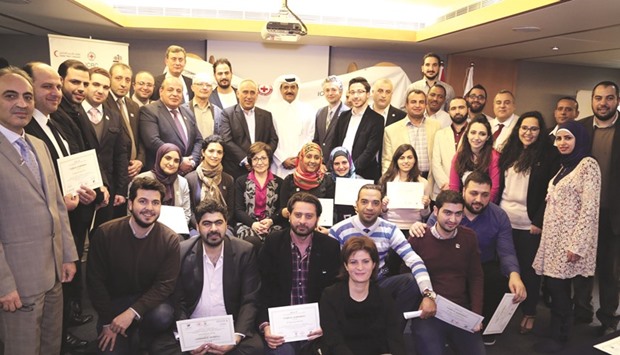The 10-day Health Emergencies in Large Populations (H.E.L.P.) Course has concluded in Beirut, Lebanon.
It was organised by Qatar Red Crescent Society (QRCS) in co-operation with International Committee of the Red Cross (ICRC), Lebanese Red Cross and Qatar University.
Held for the first time in Arabic, the course was attended by 30 representatives of Arab national societies and international organisations. Its purpose was to qualify and develop relief workers in various fields by introducing them to the major challenges of addressing community health issues in emergencies.
The closing ceremony was attended by Qatar’s ambassador to Lebanon Ali bin Hamad al-Marri and QRCS secretary-general Saleh bin Ali al-Mohannadi, who was visiting the country to inaugurate several relief projects for Syrian refugees.
In his closing speech, al-Mohannadi said: “Qatar began to organise this international course several years ago, but it was taught in English. Today, we are graduating a selection of trainees, who are skilled relief workers. Congratulations, and try to transfer your acquired knowledge to others.”
Javier Cepero, deputy head of the ICRC delegation in Lebanon, praised the participants and highlighted the Red Crescent martyrs in Syria and Palestine. “My message to the said is to keep safe and continue to pursue their humanitarian
contributions,” he added.
Fouad Bawaba, ICRC senior communications officer, thanked the organisers and lecturers for sharing their field expertise and skills. “Particular thanks go to QRCS for its great efforts to make this course possible and enrich discussions,” he noted.
Dr Paul Bouvier, ICRC senior medical adviser, stressed the importance of extending help and care to the exposed and affected people in zones of disasters and armed conflicts.
He emphasised the need to hold this course in the Mena region in view of its prevailing political circumstances, which necessitate the exchange of experience, successes and challenges as well as adopting humanitarian principles, unifying efforts and applying the best professional practices that meet the needs of victims, while
observing ethics.

The course participants with officials and dignitaries.
